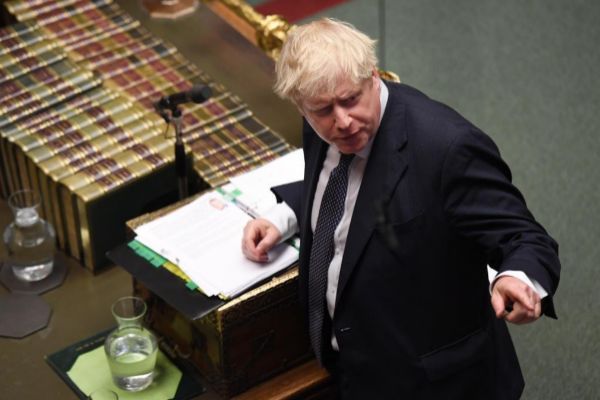- United Kingdom Westminster prevents Brexit from culminating on October 31
- Divorce in the EU: Johnson withdraws the law from the Brexit agreement after losing a key vote in Westminster
Patience is running out between 27, but nobody in Brussels wants to be responsible for a Brexit without an agreement and the president of the European Council, Donald Tusk, is looking for a formula for an extension of negotiations with the United Kingdom, the third, which accommodate France's reservations to prolong the agony, but be enough to resolve a new political blockade in London.
Neither Boris Johnson, who sent unsigned the letter requesting it, nor the member states, who were waiting for the green light of the House of Commons, want a new extension for Brexit. But given the brake on the ratification process in Parliament and the abyss of a 'no agreement' on October 31, the 27 are bound to delay the United Kingdom's departure from the EU again . The question, again, is for how long and at what price.
Donald Tusk has been probing member states since last Saturday, but it was Johnson's decision to 'pause' the legislative procedure last Tuesday that has accelerated contacts. On Wednesday, the 27 ambassadors met in Brussels to analyze the situation and discuss possible formulas and length of the extension.
According to European sources, some Member States agree that the EU needs more clarity from the United Kingdom in order to make a decision. The failure of the negotiation between Johnson and the opinion leader, Jeremy Corbyn, makes the process more difficult. That is why Tusk, who chatted on the phone with the British 'premier' that same afternoon, insisted on the need for an extension.
No consensus among the 27
In Brussels there is a certain degree of tiredness at the endless negotiation of Brexit, but also resignation. Nobody wants to face the political responsibility of the United Kingdom crashing on October 31 . Especially Ireland
Irish Prime Minister Leo Varadkar transferred Tusk by phone to support an extension until January 31, as requested by the British Government, bound by the Commons. "It is impossible for us not to give them a chance," said the Bulgarian 'premier', Boyko Borissov, in an interview. "We will write 'postponed' and 'postponed' and 'postponed', and we will continue like this 90 or 100 years," the Bulgarian joked.
But in France they don't even want to hear about it. Emmanuel Macron is the leader who has shown the most reservations so far. The position of the Frenchman is not a secret nor a novelty. Macron has been one of the most critical leaders with the extension of the negotiations. Three times. And his Secretary of State for European Affairs, Amélie de Montchalin , has made it clear that this time will be no different.
Montchalin warned last Tuesday that France would be willing to accept a "technical" extension of "a few days" to complete the process of ratification of the exit agreement. But that a long extension or a renegotiation is not on the table. Diplomatic sources confirmed to EL MUNDO that this remains the position of Paris.
Tusk seeks consensus among the 27
The 27 ambassadors to the EU will meet again on Friday and Tusk, who will continue consultations throughout the day, hopes to make a decision at the end of the week . "Everyone agrees on the need for an extension to avoid a non-agreement," said a European source. How long that extension lasts, however, remains to be decided.
Brussels measures its steps. He does not want to interfere in the political process in London, but neither does he get caught in it. If the EU opts for a long extension, Johnson could use it as an excuse to force elections ; but it also gives some oxygen to the 'remainers' who ask for more time. A short, as France asks, would pose a serious risk if the former fails to move the agreement forward.
On the table they would opt for an extension of a few weeks or return to the famous 'flextension', which already used the 27, and accept the three-month extension requested by the British Government, which would conclude as soon as the exit agreement is ratified . What seems increasingly clear is that, contrary to what Johnson promised, the United Kingdom will still be part of the EU no matter what.
According to the criteria of The Trust Project
Know more- London
- Boris johnson
- Jeremy Corbyn
- Emmanuel Macron
- Brexit
EU exit Ultimátum to Boris Johnson to change his Brexit plan
EU divorce Johnson from Westminster
United Kingdom Westminster reopens: "This Parliament is dead"

